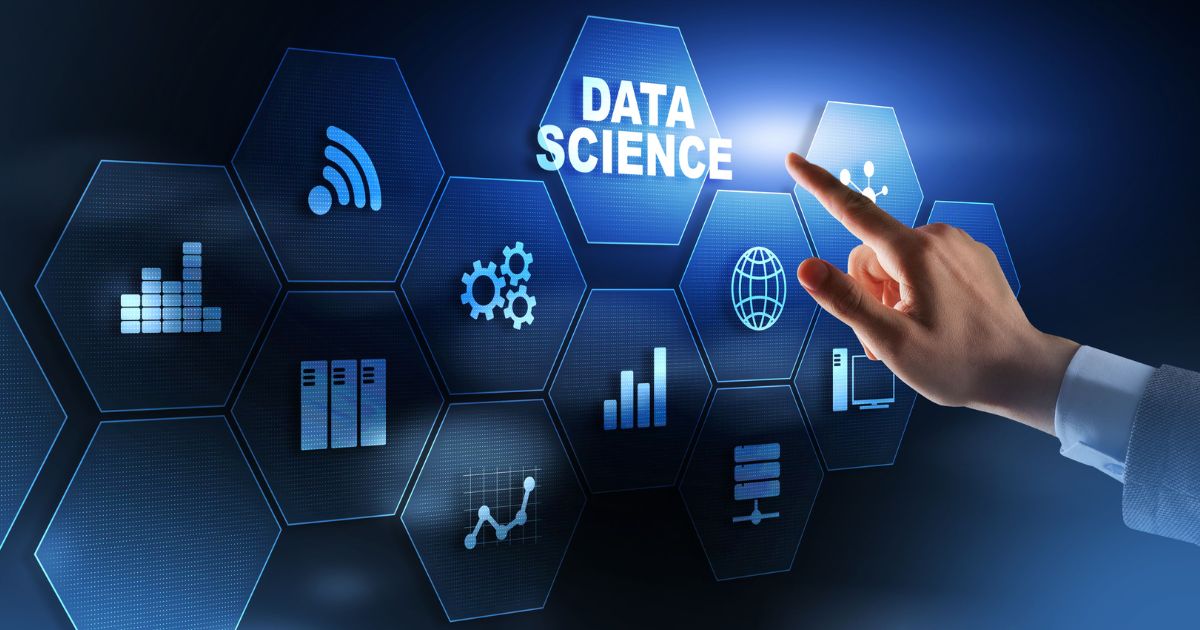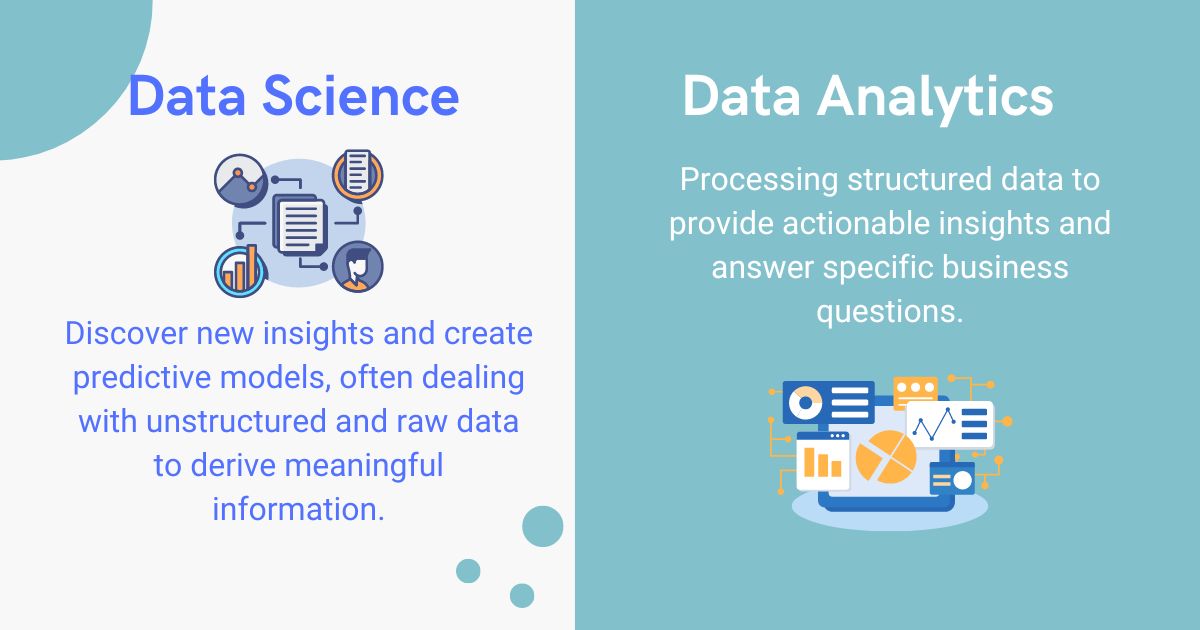Data Science vs. Data Analytics: What's the Difference?
In today’s dynamic digital age, it’s not just technology companies that are looking to capitalize on these two fields; many industries are also looking to tap into them. These are two fields that have the potential to transform businesses and industries: Data Science and Data Analytics.
Although they may seem interchangeable, these fields serve different purposes and require distinct skill sets. So understanding the difference between data science and data analytics is a knowledge baggage for anyone who wants to pursue a career in these fields or use their knowledge effectively.
What is Data Analytics?

When enter the Data analytics field, you will hone your developing skills in collecting, cleaning data, connecting data, analyzing, and exploiting information to lay the foundation and support the work of other departments and divisions. Personnel working in this field are called data analysts and often have different roles depending on each field.
Despite, it shares some tools and techniques with data science, data analytics is generally more descriptive and diagnostic. In the general business environment, the role of data analysts is to work with data to help leaders make the right decisions: using techniques and software to calculate, analyze; draw conclusions, predictions; and finally, solutions to improve business results.
For instance, a data analyst might analyze sales data to determine which products perform best in specific markets or identify inefficiencies in a supply chain. Their work often aims to provide immediate insights that can inform business decisions, optimize operations, and improve overall performance.
What is Data Science?

Data Science is a broad and interdisciplinary field. It opens up opportunities for you to extract valuable insights and predictions from large and complex datasets. In other words, data science is a special combination of various domains, such as mathematics, statistics, computer science, and domain-specific knowledge, that analyzes data deeply.
Unlike data analytics, when joining data science, you learn about many aspects of data structures, algorithm applications, machine learning, and mathematical statistics to handle different problems. In general, people who pursue the career of data scientists often work with data, but at a higher level than data analysts. They will focus most of their time on designing processes, tools, and methods to better model data. Then, interpret them to become core platforms to support product development and business strategy planning at a higher level. For example, data scientists may develop recommendation systems, predictive analytics models, or natural language processing tools.
Data scientists need strong programming skills, often utilizing languages like Python, R, or SQL, and are well-versed in frameworks such as TensorFlow, Pandas, and Scikit-learn. They work closely with business leaders and decision-makers to identify strategic opportunities for leveraging data insights, thus playing a pivotal role in shaping business strategies.
Similarities between Data Analytics and Data Science

It can be seen that the biggest common point of data analytics and data science is that they both work with data, and the ultimate goal is to help businesses solve business problems.
Besides, some common requirements for both data analysis and data science are:
• Basic understanding of algorithms, mathematics, software engineering, etc.
• Ability to interpret, present, and persuade.
• Master the essential tasks: arranging and processing raw data, statistics, extraction, analysis, trend prediction, etc.
In some small companies, these two positions are combined into one for one person to take charge of. However, if a business wants to have a competitive advantage in the digital age and not waste ideal data resources, leaders need to clearly distinguish the two positions. Thus, each person will be able to focus 100% on their own expertise, producing more effective results.
Key Differences Between Data Science vs Data Analytics

The most obvious difference between data analytics and data science is the level and depth of expertise when working. In terms of expertise, a Data Scientist is in a higher position and takes on more important responsibilities than a Data Analyst. When looking at career paths in corporations, if the goals are set at the management and executive level with a business orientation, the opportunities are equally divided for both professions.
| Data Science | Data Analytics | |
| Objective and Scope | Discover new insights and create predictive models, often dealing with unstructured and raw data to derive meaningful information. | Processing structured data to provide actionable insights and answer specific business questions. |
| Techniques and Tools | Machine learning, statistical modeling, and data mining. They rely on complex algorithms to predict future trends. | Descriptive and diagnostic analytics, employing tools like Excel, SQL, and Tableau for data visualization and reporting. |
| Responsibilities | • Searching and identifying questions that need answers, requiring questions to be valuable and promote business development. • Designing processes, models, and algorithms to process huge amounts of data. • Developing high-level tools and software to optimize and ensure data accuracy. • Create automation systems with intelligent programming techniques. | • Collaborate with other departments and leaders to identify goals and needs from data. • Mining, collecting, synthesizing, and analyzing information. • Cleaning and analyzing data. • Performing reports and interpreting results, with predictions and recommendations. • Ensuring that there is a sufficient basis for leaders to make the right decisions. |
| Skill Sets | Data scientists require strong programming skills, mathematical expertise, and experience with machine learning frameworks. | Data analysts need proficiency in data cleaning, visualization, and basic statistical analysis. |
| Outcome | Strategic insights and future predictions that drive innovation and long-term planning. | Operational insights and solutions for immediate business problems, facilitating day-to-day decision-making. |
| Complexity | Data science projects are often more complex, requiring iterative experimentation and a deep understanding of algorithms and models. | Data analytics projects are typically more straightforward, analyzing existing data to extract insights. |
Conclusion
Despite data science and data analytics sharing common ground, they differ significantly in their objectives, techniques, and outcomes. Understanding these distinctions can help individuals choose the right career path, and organizations effectively utilize data to achieve their goals. Whether you're interested in building complex models or extracting actionable insights, both fields offer valuable contributions to the data-driven landscape of modern business.
Do you want to learn more about these two exciting fields? If the answer is yes, sign up for Skilltrans courses today, we have a variety of courses at the most preferential prices.

Meet Hoang Duyen, an experienced SEO Specialist with a proven track record in driving organic growth and boosting online visibility. She has honed her skills in keyword research, on-page optimization, and technical SEO. Her expertise lies in crafting data-driven strategies that not only improve search engine rankings but also deliver tangible results for businesses.



